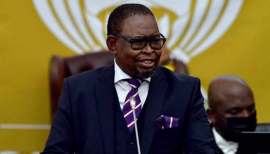
Economists have called for today’s Medium-Term Budget Policy Statement (MTBPS) to focus on strengthening the country’s debt containment efforts.
The call comes as Finance Minister Enoch Godongwana prepares to deliver the 2022 MTBPS in Cape Town today.
The statement, colloquially known as the mini-budget, will be delivered at 2pm before the National Assembly in the Cape Town City Hall. On the same day, the Minister will introduce the Adjustments Appropriation Bill.
Parliament said the 2022 MTBPS would describe the policy framework for the 2023 Budget and indicate any adjustments that may be recommended to Parliament regarding the current year's expenditure plans.
“As a statement of government policy, it will also assess and explain the trade-offs and choices that must be made to ensure stable, balanced and sustainable economic growth,” it said in a statement.
In its MTBPS review, Nedbank said it expects real GDP growth of 1.8% in 2022, slightly lower than the National Treasury’s 2.1% forecast.
The bank’s economists in the document predict that in 2023, the economy will grapple with the global slowdown and higher interest rates.
“The intense load shedding, the lingering effects of the damage caused by the KwaZulu-Natal floods, labour strikes, and the Russia-Ukraine war pose downside risks to our growth forecasts. We expect growth to fall to 1.2% in 2023, compared with the National Treasury’s 1.6%. Therefore, we expect National Treasury to lower its real GDP growth forecasts and raise its inflation projections,” the bank said.
The bank said it expects tax collections in 2022/23 to exceed the February 2022 budget estimate by around R130 billion, as high inflation has boosted nominal GDP and tax payments.
“International commodity prices also remained relatively high over the first six months of the fiscal year, likely supporting corporate earnings and offsetting the impact of lower mining and manufacturing output,” Nedbank predicts.
The public sector wage bill poses the most significant risk to the government’s objective to keep non-interest recurrent spending under control, said the economists.
“We expect expenditure to increase by an annual average of 6.4% (in nominal terms) between 2022/23 and 2024/25. The public sector wage bill will rise by an average of about 5% per year over the MediumTerm Expenditure Framework (MTEF, 2022/23 to 2024/25). The limits on new hires will only help contain the wage bill after 2025/26. Bailouts for Eskom and Transnet, higher social transfers, and rising debt service costs add to the expenditure bill,” they said.
Annabel Bishop, Investec chief economist, said the Budget will show further fiscal containment while high inflation has a moderating effect on fiscal ratios.
She said the deterioration in the performance of key SOEs had been a severe limitation on the country’s growth potential.
In this regard, she anticipates the MTBPS to outline some of government’s plans for Eskom’s debt, with market anticipation that the state may absorb at least some.
She said: “Uncertainty still remains high for forecasts, and so risks for volatility persist, although markets have largely priced in the risks of high interest rates and recession. “More dovish tones from Central Banks would improve market outlooks with tomorrows FOMC minutes key, along with US CPI inflation figures.”
The impact of the good mini-budget this year on markets is likely to be overshadowed by the heavy risk aversion environment in global financial markets, as it occurs in the run-up to the November FOMC meeting, she said. – SAnews.gov.za


